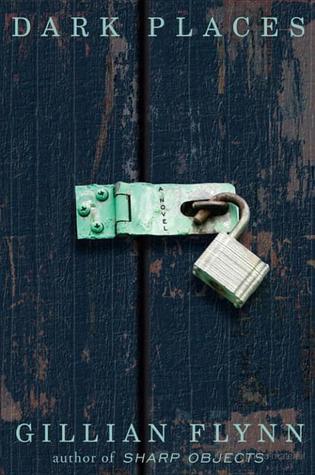Reading is like breathing — don’t do enough of it and your brain cells start to die. Not necessarily the brain cells responsible for walking, hanging up on telephone solicitors and calculating four-way tips on a restaurant bill, but the ones responsible for writing. And I do a lot of writing so it’s necessary that I read.

Dark Places: Don’t let the padlock fool you. There isn’t much inside.
Over the last year I’ve been remiss in my reading habits, as you can tell if you scroll down to the previous book review in this blog and note that it was posted on July 27, 2014. Not that I haven’t been reading since then. I have. I’ve been reading the beginnings of books that I never finished, click-bait articles that somehow wandered into my Facebook feed and the occasional magazine (though I’ve been falling behind in my magazine reading too, something I plan to remedy).
I also read two entire novels during the last year, which I’ve somehow never gotten around to writing about here. I plan to remedy that too, starting with this post, which is about Gillian Flynn’s novel Dark Places. Unfortunately, I don’t really remember a whole lot about Dark Places, partly because it’s been close to a year since I read it and partly because, well, it wasn’t all that memorable.
Not that it was bad. I suspect that anything by Flynn is worth reading, which is why I picked it up, having been deeply impressed by the wit, plotting and deftly deceptive characterization in Flynn’s novel Gone Girl when I read it three years ago. I read Dark Places looking for more of the same and to some extent I found it — at least Dark Places has the same acerbic, observational cleverness of Gone Girl and some of the same strong characterization, but in the matter of plot it felt like Flynn started with the spark of an idea that she never managed to kindle (no pun on my ebook reader intended) into an actual flame.
I honestly don’t remember a lot of the plot, but here’s what I can give you: Libby Day, a 30-ish woman who survived the violent massacre of her family when she was a child, has spent most of her life living on the charitable funds generated by the sympathetic stories about her that periodically grace the pages of magazines and true-crime newscasts. The charity is running out, however, and Libby, who has never worked for a living, finds herself with no marketable skills and no desire to develop the sort of likable personality that might get her either a job or a husband. It’s this desperation for funds that drives her to accept a paid invitation from a club of amateur crime solvers who enjoy revisiting particularly gruesome murder narratives and finding flaws in the original conclusions reached by the judiciary system.
Libby expects the club to consist of creeps and borderline psychos who get off on blood and gore, but they’re mostly harmless nerds who enjoy arguing about clues and courtroom testimony. The particular subgroup dedicated to the Day family massacre is largely convinced that the person eventually convicted of the crime, Libby’s older brother, is innocent — which comes as a surprise to Libby, because she’s pretty much accepted her brother’s culpability, even though he was probably the family member closest to her before the killings occurred. She never visits him in prison and is reluctant to do so even at the club’s request, until they offer her money to talk to him. Being on the verge of homelessness actually motivates Libby to discard her apathy — and, more importantly, to face up to the “dark places” in her brain that concern the crime — in ways that she hasn’t over the previous quarter of a century. The club members gradually convince her that her brother may in fact be innocent, and, um, things happen. There’s something about the brother’s former girlfriend and a lot about women with red hair, a hallmark of the Day family.
Wish I could tell you more — and I probably could have, back when I’d finished the book. Though I suspect that one of the reasons I’ve put off writing this review for so long is that I really didn’t have a lot to say about it even then. I remember finding the ending not entirely satisfactory; I felt that Flynn had thrown in one plot element too many, perhaps to throw red herrings in the reader’s path, more likely because she felt she was at least one subplot short of a novel.
Whatever, my enthusiasm for Flynn’s writing remains undimmed, but it still largely hinges on the deep impression that Gone Girl made with me. Eventually I’ll go back and read Flynn’s first novel, Sharp Objects, and probably be even more disappointed, but as a stylist Flynn is engaging enough that even her lesser works, like this one, are worth reading.